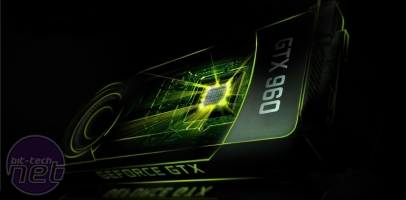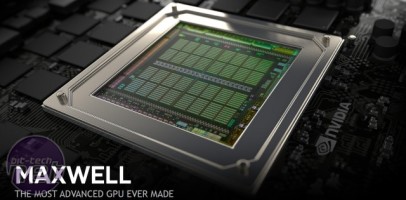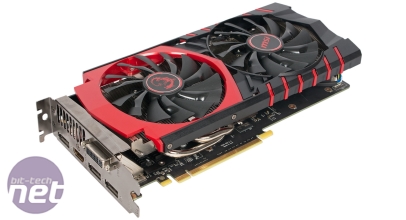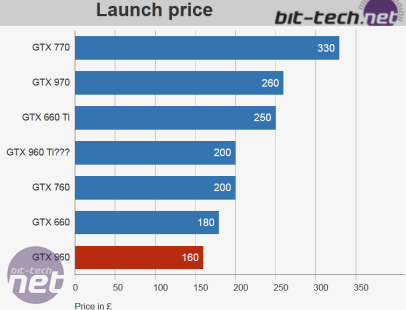
It's taken a while to arrive but the eagerly-awaited sub-£200 version of Nvidia's Maxwell-based graphics cards is finally here. However, the GTX 960 is not quite what we were all expecting. [break]
I, for one, was eagerly awaiting Nvidia's mid-range 900-series graphics card for a couple of reasons. In the summer, my small office gets pretty toasty and even my Core i5-3570K and GTX 660 Ti-based system can make things unbearably hot when gaming. I even considered downgrading to a GTX 750 Ti when Nvidia's Maxwell architecture first hit the shelves just to shave 100W or so off the gaming power draw.
With it being a mini-ITX system, and the fact I'm regularly swapping components in and out too, I need a graphics card that's small. The GTX 970 does offer a few options here with small PCB models, but it not only draws more power than my GTX 660 Ti, but it's overkill for my 1,920 x 1,200 monitor in the games I play too. I wouldn't mind a small bump, but the GTX 970 is more than I need.
I'm all for PCs being efficient too - after all, I'm well aware that consuming 50-100W more power under load can add up to sizable increase in your electricity bill over time - one reason why I was keen to see how the GTX 960 fared and not really considering anything from AMD's current crop of GPUs as well. While AMD still holds the price/performance ratio in some areas, even against the GTX 960, if you're concerned about heat and power consumption then Nvidia is currently king.

The GTX 960 is very efficient but are we right to be disappointed with its performance?
So when Matt was testing our GTX 960 samples last week, I was regularly peering over his shoulder to see how they were performing. Like quite a few of you it seems, I was assuming the GTX 960 would offer a decent upgrade from the GTX 760 and make a good investment if your GTX 660, 660 Ti or 670 were showing their age too.
We've gotten used to the fact that a next generation card usually performs the same as the model above in the previous generation. As such, I didn't think it was unreasonable to assume that the GTX 960 would give the GTX 770 a run for its money too.

Maxwell has a well-deserved reputation for performance and efficiency - can the GTX 960 replicate the GTX 970's success?
The efficiency was beyond doubt as well - consuming less than 240W under load, MSI's GeForce GTX 960 Gaming 2G drew a massive 55W less than the GTX 760 and nearly 30W less than my GTX 660 Ti. This was great news, but something that wasn't as joyous to read was the fact that the GTX 960 basically performs the same as a GTX 760.
This has quite a few ramifications. For starters, it means that owners of any Nvidia card from a GTX 660 upwards aren't going to see significant gains in games. The GTX 960 might make marginally playable games a bit smoother compared to the GTX 660, but that's it. This in my mind isn't great news and for me personally, owning a GTX 660 Ti, while my room would be a little cooler in summer, it means I wouldn't see much if any improvement in games given that our older benchmarks show that it performs similarly to the GTX 760.

Even overclocked models such as MSI's GeForce GTX 960 Gaming 2G offer much better power efficiency than the GTX 760 - default-clocked models will likely consume even less power
That isn't the whole story of course. As we mentioned in the review, there's a huge gap in performance and price between the GTX 960 and GTX 970, and that gap will likely be filled by a GTX 960 Ti. The important thing to remember is, and bear with me here, that the GTX 660 Ti retailed for around £250 at launch - considerably more than the GTX 960. In fact, even the GTX 760 cost substantially more than the £160-180 you could buy a GTX 960 for at launch.
Yes, you can buy GTX 600 and GTX 700-series cards for knock down prices at the moment but in the overall scheme of things, the GTX 960 is most likely the sibling of a Ti variant and even at launch, it pretty much sits where it should in terms of price and performance. The GTX 760 is faster because there was no 760 Ti so it has to sit in the middle ground. So, ignoring current prices, the fact the GTX 960 performs the same means it is actually faster than where a GTX 760 would have sat if there had been a GTX 760 Ti involved too.
Equally, the fact it performs a little better than a GTX 660 Ti - a card that cost close to £100 more at launch a couple of years ago further cements the fact that the the GTX 960 does offer more performance than its predecessors based on its launch price. Likewise, if you want a decent bump in performance from a GTX 760, then a GTX 960 Ti (assuming such a card launches) or GTX 970 is where you should be aiming.
After all, if you're going to get better performance than a GTX 760, then you'd expect to pay the same or more than it did at launch, which was between £200 and £250. Surprise surprise that's at the low end of GTX 970 territory, also where a GTX 960 Ti would likely slot in and well above what the GTX 960 currently retails for - it's not surprising then that the GTX 960 doesn't offer much of an upgrade - it already performs the same as previous models that cost a lot more at launch.

The GTX 960 doesn't trounce the GTX 760 because it cost far less at launch - it's essentially the same as a GTX 660, but even that cost more at launch.
So, all things considered, not to mention that the GTX 960 will likely drop well below £150 before the summer, it's not actually as bad as you might first think given its launch price. Yes Nvidia has higher yields these days and it doesn't beat the GTX 760, but then, the GTX 760 isn't its direct equivalent in the GTX 700-series - it's actually a step above where the GTX 960 will likely end up once the GTX 900-series is complete. Of course, this whole argument rests on whether Nvidia launches a GTX 960 Ti, but given the huge gap in price and performance between the GTX 960 and GTX 970, I think it's highly likely.
What are your thoughts on the GTX 960? Let us know in the forum.
I, for one, was eagerly awaiting Nvidia's mid-range 900-series graphics card for a couple of reasons. In the summer, my small office gets pretty toasty and even my Core i5-3570K and GTX 660 Ti-based system can make things unbearably hot when gaming. I even considered downgrading to a GTX 750 Ti when Nvidia's Maxwell architecture first hit the shelves just to shave 100W or so off the gaming power draw.
With it being a mini-ITX system, and the fact I'm regularly swapping components in and out too, I need a graphics card that's small. The GTX 970 does offer a few options here with small PCB models, but it not only draws more power than my GTX 660 Ti, but it's overkill for my 1,920 x 1,200 monitor in the games I play too. I wouldn't mind a small bump, but the GTX 970 is more than I need.
I'm all for PCs being efficient too - after all, I'm well aware that consuming 50-100W more power under load can add up to sizable increase in your electricity bill over time - one reason why I was keen to see how the GTX 960 fared and not really considering anything from AMD's current crop of GPUs as well. While AMD still holds the price/performance ratio in some areas, even against the GTX 960, if you're concerned about heat and power consumption then Nvidia is currently king.

The GTX 960 is very efficient but are we right to be disappointed with its performance?
So when Matt was testing our GTX 960 samples last week, I was regularly peering over his shoulder to see how they were performing. Like quite a few of you it seems, I was assuming the GTX 960 would offer a decent upgrade from the GTX 760 and make a good investment if your GTX 660, 660 Ti or 670 were showing their age too.
We've gotten used to the fact that a next generation card usually performs the same as the model above in the previous generation. As such, I didn't think it was unreasonable to assume that the GTX 960 would give the GTX 770 a run for its money too.

Maxwell has a well-deserved reputation for performance and efficiency - can the GTX 960 replicate the GTX 970's success?
The efficiency was beyond doubt as well - consuming less than 240W under load, MSI's GeForce GTX 960 Gaming 2G drew a massive 55W less than the GTX 760 and nearly 30W less than my GTX 660 Ti. This was great news, but something that wasn't as joyous to read was the fact that the GTX 960 basically performs the same as a GTX 760.
This has quite a few ramifications. For starters, it means that owners of any Nvidia card from a GTX 660 upwards aren't going to see significant gains in games. The GTX 960 might make marginally playable games a bit smoother compared to the GTX 660, but that's it. This in my mind isn't great news and for me personally, owning a GTX 660 Ti, while my room would be a little cooler in summer, it means I wouldn't see much if any improvement in games given that our older benchmarks show that it performs similarly to the GTX 760.

Even overclocked models such as MSI's GeForce GTX 960 Gaming 2G offer much better power efficiency than the GTX 760 - default-clocked models will likely consume even less power
That isn't the whole story of course. As we mentioned in the review, there's a huge gap in performance and price between the GTX 960 and GTX 970, and that gap will likely be filled by a GTX 960 Ti. The important thing to remember is, and bear with me here, that the GTX 660 Ti retailed for around £250 at launch - considerably more than the GTX 960. In fact, even the GTX 760 cost substantially more than the £160-180 you could buy a GTX 960 for at launch.
Yes, you can buy GTX 600 and GTX 700-series cards for knock down prices at the moment but in the overall scheme of things, the GTX 960 is most likely the sibling of a Ti variant and even at launch, it pretty much sits where it should in terms of price and performance. The GTX 760 is faster because there was no 760 Ti so it has to sit in the middle ground. So, ignoring current prices, the fact the GTX 960 performs the same means it is actually faster than where a GTX 760 would have sat if there had been a GTX 760 Ti involved too.
Equally, the fact it performs a little better than a GTX 660 Ti - a card that cost close to £100 more at launch a couple of years ago further cements the fact that the the GTX 960 does offer more performance than its predecessors based on its launch price. Likewise, if you want a decent bump in performance from a GTX 760, then a GTX 960 Ti (assuming such a card launches) or GTX 970 is where you should be aiming.
After all, if you're going to get better performance than a GTX 760, then you'd expect to pay the same or more than it did at launch, which was between £200 and £250. Surprise surprise that's at the low end of GTX 970 territory, also where a GTX 960 Ti would likely slot in and well above what the GTX 960 currently retails for - it's not surprising then that the GTX 960 doesn't offer much of an upgrade - it already performs the same as previous models that cost a lot more at launch.

The GTX 960 doesn't trounce the GTX 760 because it cost far less at launch - it's essentially the same as a GTX 660, but even that cost more at launch.
So, all things considered, not to mention that the GTX 960 will likely drop well below £150 before the summer, it's not actually as bad as you might first think given its launch price. Yes Nvidia has higher yields these days and it doesn't beat the GTX 760, but then, the GTX 760 isn't its direct equivalent in the GTX 700-series - it's actually a step above where the GTX 960 will likely end up once the GTX 900-series is complete. Of course, this whole argument rests on whether Nvidia launches a GTX 960 Ti, but given the huge gap in price and performance between the GTX 960 and GTX 970, I think it's highly likely.
What are your thoughts on the GTX 960? Let us know in the forum.

MSI MPG Velox 100R Chassis Review
October 14 2021 | 15:04





Want to comment? Please log in.